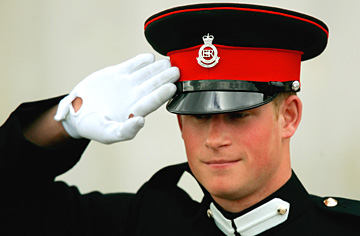
Britain's Prince Harry salutes after the Sovereign's Parade at the Royal Military Academy in Sandhurst, southern England April 12, 2006.
Harry carries the rank of "Cornet," equivalent to a 2nd Lieutenant, and will command a troop of 12 men in four Scimitar armored reconnaissance vehicles, each with a crew of three. The Ministry of Defense said that "the decision to deploy him had been a military one, made by the Chief of the General Staff, General Sir Richard Dannatt, in conjunction with Cornet Wales' commanding officer," adding that "the Royal Household has been consulted throughout."
The deployment comes at a difficult time for British forces there. Troop levels are now at some 7,100 down from a peak of 18,000 in May 2003 and the Prime Minister has just announced a further reduction to 5,500 as part of the rotation that will see the Prince deploy to Iraq; but 2006 saw an increase in fatalities over the previous two years, military adventures in other theaters are stretching resources, and politicians back home continue to bicker over the scale and duration of Britain's commitment to the region. Such a high-profile figure could attract the unwanted attention of insurgents — and of the very media Harry hoped to leave behind.
That's unlikely to dent Harry's enthusiasm for action. Displaying an unexpected talent for the demotic in an interview to mark his coming of age in 2005, the young officer said, "There's no way I'm going to... sit on my arse back home while my boys are out fighting for their country."
His sentiments are reminiscent of those expressed a quarter of a century ago when his uncle, Prince Andrew, then also 22, prevailed against opponents who feared that his participation in the Falklands conflict could prove at best a distraction and, at worst, a liability to his colleagues. Instead, as a helicopter pilot on the aircraft carrier HMS Invincible, he acquitted himself with honor during an episode that he described in an interview with TIME as "an adventure."
"We were being sent 8,000 miles to recover a group of islands that had been illegally invaded, and we were going to have the leashes removed and allowed to do what we had been trained for," he told TIME. "It was exciting and at the same time nerve-wracking. I would describe the sensation of modern warfare, or at least as it was for us 25 years ago, as 99 per cent boring, routine, intense and repetitive, and then 1 per cent terror and frenetic activity when an attack came in." He added: "The speed of attack was so much faster than in previous campaigns, as the aircraft were all jet-powered and the missiles were intelligent rather than the propeller-driven aircraft of World War II and iron bombs."
The ability to stay calm under fire may well have saved the older prince from undignified skirmishes with the paparazzi during subsequent years in the navy and since 2001 as a working royal. No matter the prodigious number of cucumber sandwiches he nibbles for Queen and Country, or however skilfully he promotes British business as the U.K.'s Special Representative for International Trade and Investment (public records show he undertook 446 engagements in 2006, excluding business meetings), Elizabeth's second son never shakes off his tabloid image as a feckless playboy — an image photographers find profitable to reinforce.
Harry is facing many of the same attentions. In 2004 a photographer accused the younger Windsor of taking a swing at him as the prince left a nightclub. That youthful vim and vigor will be directed against a more dangerous enemy in the months ahead. But if the experience of his uncle is anything to go by, the skepticism of the media could prove harder to vanquish.
